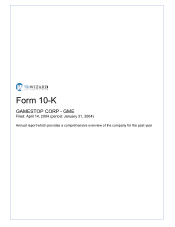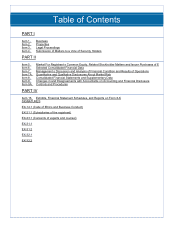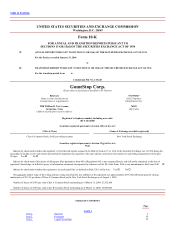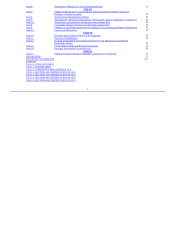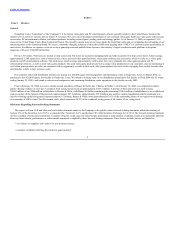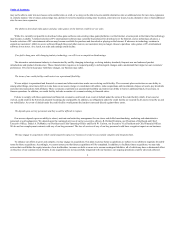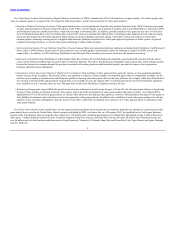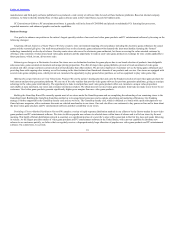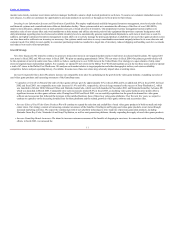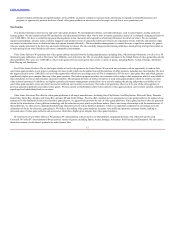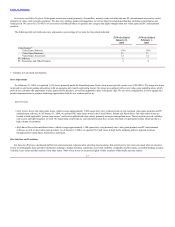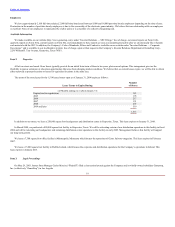GameStop 2003 Annual Report Download - page 17
Download and view the complete annual report
Please find page 17 of the 2003 GameStop annual report below. You can navigate through the pages in the report by either clicking on the pages listed below, or by using the keyword search tool below to find specific information within the annual report.
Table of Contents
approximately 7.3% of our outstanding common stock. As a result, Mr. Riggio may have substantial control over the management and affairs of our company.
Barnes & Noble is under no obligation to resolve any potential conflicts between it and us in a manner that is favorable to us, and we cannot guarantee that the
resolution of such conflicts would not adversely impact our business or prospects.
The limited voting rights of our Class A common stock could impact its attractiveness to investors and its liquidity and, as a result, its market value.
The holders of our Class A and Class B common stock generally have identical rights, except that holders of our Class A common stock are entitled to one vote per
share and holders of our Class B common stock are entitled to ten votes per share on all matters to be voted on by stockholders. The difference in the voting rights of
the Class A and Class B common stock could diminish the value of the Class A common stock to the extent that investors or any potential future purchasers of our
Class A common stock ascribe value to the superior voting rights of the Class B common stock.
Our ability to issue common stock may be hampered because of our relationship with Barnes & Noble, which may interfere with our ability to grow our business.
Barnes & Noble may wish to maintain until October 2004 or thereafter its current ownership of our Class B common stock in order to qualify for a tax-free
distribution of such stock to its stockholders. Barnes & Noble owns 100% of the outstanding Class B common stock, which represents 94.5% of the combined voting
power of all classes of our voting stock. It may be difficult for us to issue common stock in the future because of Barnes & Noble’s control of us. In addition, we have
entered into a separation agreement with Barnes & Noble that restricts our ability to issue equity securities or securities convertible into equity securities if the effect of
the issuance would be to preclude a tax-free distribution by Barnes & Noble to its stockholders or our consolidation with Barnes & Noble for its financial reporting
purposes. If we are unable to issue common stock, we may be unable to raise additional capital, which we may need to fund our business.
Certain affiliate agreements we have with Barnes & Noble could prevent us from, or increase our cost in, taking certain actions.
We have entered into various agreements with Barnes & Noble, including a separation agreement, an insurance agreement, an operating agreement, a tax
disaffiliation agreement and a registration rights agreement. Because of our current status as a majority-owned subsidiary of Barnes & Noble, these agreements, or some
of our future intercompany agreements with Barnes & Noble, may not be the result of arms’ length negotiations. For example, these agreements may contain terms and
conditions that are less favorable to us than we could have obtained from independent third parties, and may prevent change of control attempts that are beneficial to our
stockholders and restrict our ability to take certain business actions, such as selling our assets or business or issuing additional shares of our common stock.
A change of control of GameStop may result if Barnes & Noble defaults on its credit facility.
Barnes & Noble has pledged to its lenders its ownership interest in the entity that owns our shares of common stock as collateral for its credit facility. If Barnes &
Noble defaults on its credit facility, our common stock owned by Barnes & Noble could be transferred to its lenders or sold to third parties. There can be no assurance
that any new owner will have the qualifications or ability to successfully operate our business.
Industry Background
According to NPD Group, Inc., a market research firm, the electronic game industry was an approximately $11.0 billion market in the United States in 2003. Of
this $11.0 billion market, approximately $10.0 billion was attributable to video game products, excluding sales of used video game products, and approximately
$1.0 billion was attributable to PC entertainment software.
8


